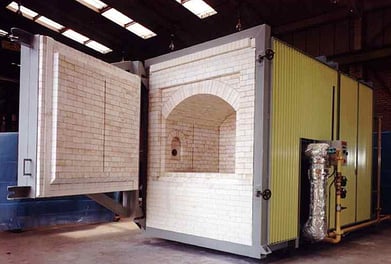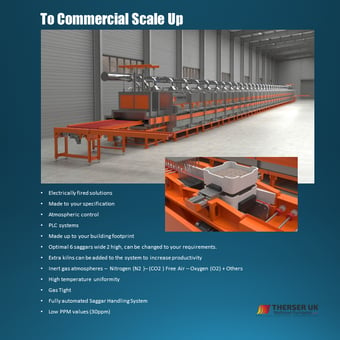Share this
Electric vs Gas Kilns: Choosing the Right Option for Your Firing Needs
by Therser UK on 24-Oct-2023 08:29:56
Electric kilns utilize the power of electricity to generate heat, employing specially designed heating elements made of durable materials like kanthal or nichrome that can withstand extreme temperatures without deteriorating. These elements are strategically placed within the kiln and connected to a sophisticated controller, which effectively regulates the temperature by intelligently turning the elements on and off as required.

Furthermore, electric kilns offer the advantage of precise temperature control. The heating elements can be programmed to maintain a specific temperature within a few degrees, ensuring consistent and reliable results when firing ceramics. Additionally, electric kilns can be equipped with advanced digital controllers that allow users to program multiple firing schedules and save them for future use.
However, it is important to consider the drawbacks of electric kilns. They may be more expensive to operate in areas where electricity costs are high, and they may require a dedicated electrical circuit with a high amperage capacity. Furthermore, electric kilns may take longer to reach high temperatures compared to gas kilns, which can be a disadvantage for users who need to fire ceramics quickly.
On the other hand, gas kilns are powered by natural gas or propane and utilize burners to generate heat. The burners are strategically placed at the bottom of the kiln, allowing the heat to rise up through the ceramics and reach the desired temperature. Gas kilns have the advantage of achieving higher temperatures more rapidly than electric kilns, making them an ideal choice for users who require quick firing of ceramics.
One notable advantage of gas kilns is their reliability during power outages or electrical issues that could disrupt the firing process. Additionally, they produce combustion gases that must be vented outside, contributing to a cleaner and safer studio or workspace environment.
However, there are drawbacks to using gas kilns as well. They require a steady supply of natural gas or propane, which may not be readily available in all areas. Furthermore, the installation and maintenance of a chimney or flue for ventilation can be costly. Gas kilns also carry a higher level of risk compared to electric kilns if not used correctly, and regular maintenance is essential to ensure proper functioning of the burners and overall safety of the kiln.

To conclude, both electric and gas kilns have their own advantages and disadvantages, and the choice between the two depends on the specific needs and preferences of the user. Electric kilns are generally easier to install and maintain, offering precise temperature control, while gas kilns excel in achieving high temperatures quickly and maintaining firing processes during power outages. Ultimately, factors such as fuel and electricity costs, fuel source availability, and individual requirements will determine the ideal kiln type for each user.
Please contact our sales team today on 44 (0)1782 824453 or drop us an email to sales@therseruk.com
Share this
- Company News (90)
- Battery Materials (41)
- kiln (37)
- fabrication (29)
- Alloy (27)
- Furnace (27)
- Welding (16)
- Industrial Kilns (15)
- Battery (13)
- Ceramic Kilns (13)
- Processes (13)
- alloy fabrication (13)
- Shuttle Kilns (12)
- RTO’s (11)
- Vacancies (11)
- Hydrogen (10)
- Therser UK (9)
- Tunnel Kiln (9)
- Refractory (8)
- Therser (8)
- Wellman Furnaces (8)
- Brickwork (7)
- Case Studies (7)
- Afterburners (6)
- Fibre Lining (6)
- electric (6)
- Almor Wellman (5)
- thermal engineers (5)
- Biochar (4)
- Exhibition (4)
- Pyrolysis (4)
- Servicing (4)
- Spares (4)
- heat treatment (4)
- History (3)
- Ceramics Uk (2)
- Combustion Control Upgrades (2)
- Nitrogen (2)
- Temperature Control Rings (2)
- gas (2)
- Certificates (1)
- Instrumentation (1)
- MMC (1)
- RHK (1)
- Roller Hearth Kiln (1)
- Test Trials (1)
- aerospace (1)
- analyser (1)
- elec (1)
- oxygen (1)
- vans (1)
- September 2025 (2)
- May 2025 (2)
- March 2025 (1)
- February 2025 (2)
- January 2025 (5)
- December 2024 (5)
- November 2024 (7)
- October 2024 (5)
- September 2024 (4)
- August 2024 (14)
- July 2024 (13)
- June 2024 (2)
- May 2024 (5)
- April 2024 (13)
- March 2024 (8)
- February 2024 (12)
- January 2024 (14)
- December 2023 (6)
- November 2023 (12)
- October 2023 (24)
- September 2023 (11)
- August 2023 (11)
- July 2023 (9)
- June 2023 (15)
- May 2023 (53)
- April 2023 (5)
- March 2023 (6)
- February 2023 (7)
- January 2023 (3)
- December 2022 (8)
- November 2022 (5)
- October 2022 (11)
- September 2022 (1)
- August 2022 (2)
- July 2022 (1)
- June 2022 (2)
- May 2022 (1)
- March 2022 (1)
- February 2022 (1)
- January 2022 (1)
- December 2021 (3)
- October 2021 (1)
- August 2021 (1)
- June 2021 (1)
- May 2021 (4)
- April 2021 (2)
- March 2021 (4)
- February 2021 (2)
- December 2020 (3)
- November 2020 (1)
- September 2020 (3)
- May 2020 (1)
- April 2020 (2)
- March 2020 (1)
- January 2020 (1)
- December 2019 (1)
- July 2019 (2)
- June 2019 (1)
- April 2019 (2)
- March 2019 (3)
- February 2019 (4)
- December 2018 (1)
- November 2018 (1)
- September 2018 (2)
- August 2018 (1)
- July 2018 (1)
- May 2018 (3)
- April 2018 (1)
- February 2018 (3)
- January 2018 (2)
- December 2017 (3)
- November 2017 (1)
- October 2017 (2)
- September 2017 (4)
- August 2017 (1)
- July 2017 (2)
- June 2017 (2)
- May 2017 (3)
- April 2017 (3)

